Launching a successful B2B podcast isn't just about great ideas; it's about clear, professional audio that commands authority and builds trust with your target audience. The right gear is the foundation of a show that sounds polished and professional, distinguishing your brand in a crowded market. Yet, navigating the endless options for microphones, mixers, and interfaces can be overwhelming for marketing and demand-gen teams focused on driving results, not on becoming audio engineers.
This guide simplifies the process. We have curated the definitive list of retailers and direct-to-brand sites to find the exact podcast equipment needed for any B2B setup, from a solo founder's home office to a fully-equipped corporate studio. We cut through the noise to show you where to buy, what to look for, and how each piece fits into a larger strategy for creating a high-impact podcast that generates measurable ROI. Each recommendation includes direct links and practical insights to help you make informed decisions quickly. Forget the guesswork; this is your blueprint for building a professional B2B podcast studio that elevates your market presence and establishes thought leadership.
1. Sweetwater
Sweetwater stands out as a premier online retailer for pro audio gear, making it a top destination for anyone sourcing the podcast equipment needed to launch a professional-sounding B2B show. Beyond just selling products, they function as a consultative partner. Their dedicated "Podcasting Equipment" hub is expertly curated, guiding users through microphones, interfaces, and complete bundles tailored to specific needs, from solo hosts to multi-person interview setups.
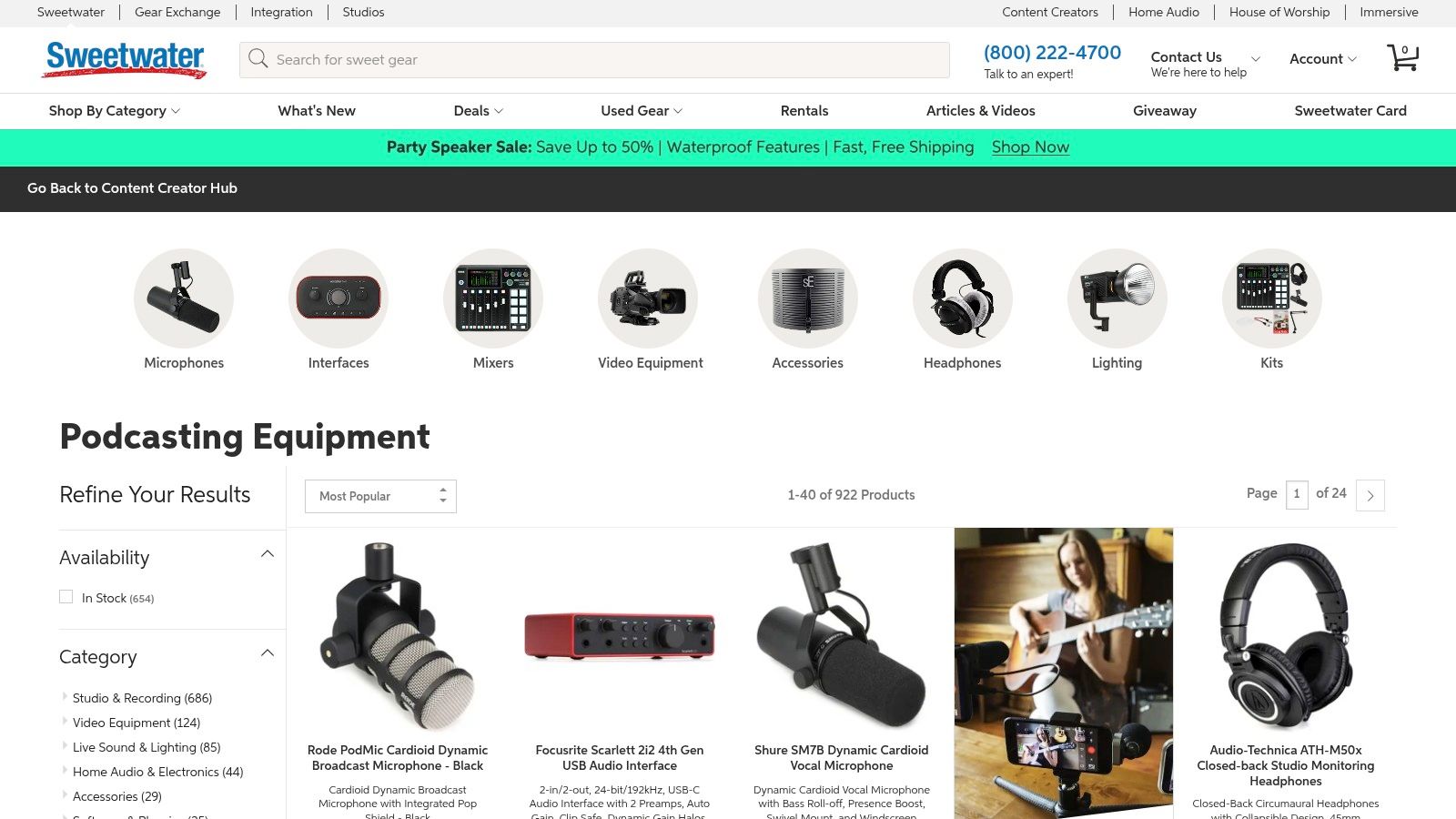
The platform’s key differentiator is its Sales Engineers. These are highly knowledgeable audio experts available via phone or chat to provide personalized recommendations, ensuring your investment aligns perfectly with your production goals. This level of support is invaluable for B2B marketers who need reliable equipment without becoming audio engineers themselves. Once you have your gear, you can learn more about effective B2B podcast marketing to maximize your reach. Sweetwater also offers financing options, making high-end equipment more accessible for companies investing in their content strategy.
Pros and Cons
Pros:
- Expert Support: Direct access to Sales Engineers for personalized advice.
- Curated Selection: Easy-to-navigate sections for all podcasting essentials.
- Financing: Flexible payment options help manage upfront costs.
Cons:
- Fewer Discounts: Prices typically adhere to MAP (Minimum Advertised Price).
- Stock Issues: High-demand items can sometimes be back-ordered.
Website: https://www.sweetwater.com/shop/content-creator/podcasting-equipment/
2. B&H Photo Video
B&H Photo Video is a powerhouse retailer for professional media production, and its dedicated podcasting department offers one of the most comprehensive online catalogs for the podcast equipment needed to produce a high-quality B2B show. The platform excels in offering not just individual components but also value-add kits and exclusive bundles, making it easy to purchase a complete setup in one go. Whether you need a multi-person rig built around a RØDECaster Pro or a simple USB mic for a solo host, B&H provides clearly categorized options.
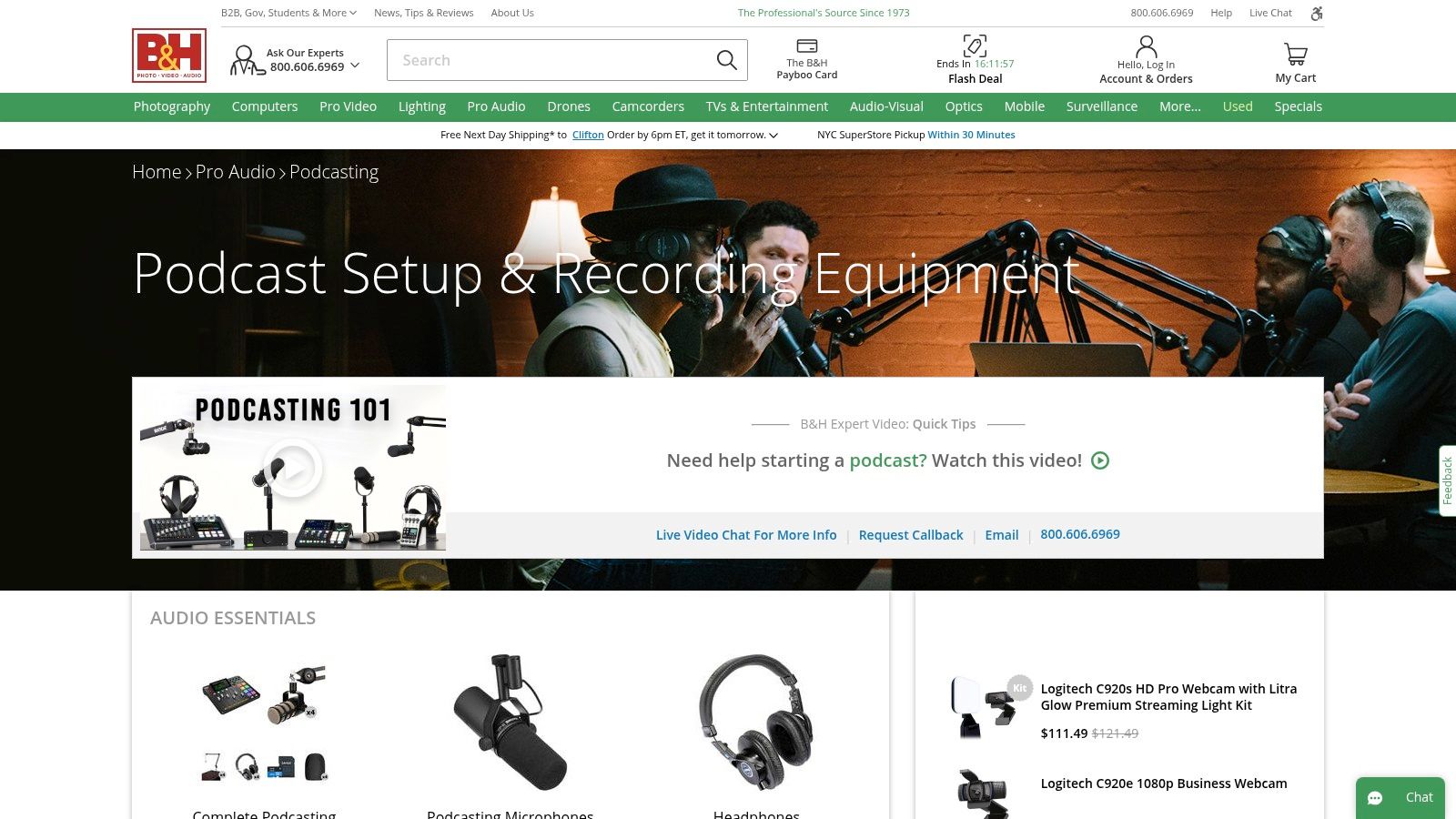
The platform is particularly useful for B2B marketers looking for competitive pricing and fast, reliable shipping across the US. Their site clearly displays stock status, which is crucial for planning your production timeline. You can easily compare dynamic versus condenser microphones or explore pre-packaged kits that bundle popular mics like the Shure SM7B with essential accessories like boom arms and cables. This bundling strategy often provides significant savings and simplifies the purchasing process, ensuring you get compatible gear without extensive research.
Pros and Cons
Pros:
- Large Selection: A massive inventory with frequent B&H-exclusive bundles.
- Free Expedited Shipping: Many items qualify for fast, free shipping.
- Competitive Pricing: Often features deals and value-add kits.
Cons:
- Stock Fluctuations: Availability of popular items can change quickly.
- Back-Orders: Some gear may be on back-order or require a special order.
Website: https://www.bhphotovideo.com/c/browse/podcasting/ci/46431
3. Adorama
Adorama is a trusted retailer that simplifies the process of finding the right podcast equipment needed by organizing its inventory into highly specific, curated collections. For B2B marketers who value clear guidance, their dedicated "Best Podcast Gear" and "Portable Podcasting Equipment" lists are invaluable. These pages act as up-to-date buying guides, featuring top-rated microphones, interfaces, and mixers with current pricing, removing much of the guesswork from the purchasing process.
The platform excels at creating bundles and featuring a diverse range of brands like RØDE, Audio-Technica, and MOTU, which is ideal for teams seeking either an all-in-one starter kit or specific components for an existing setup. Their focus on portable solutions is a key differentiator, catering to B2B teams who record on-site at events or need a flexible mobile studio. The educational content and clear gear explanations on their category pages help users make informed decisions without needing deep technical knowledge.
Pros and Cons
Pros:
- Curated Collections: Themed lists like "Best Podcast Gear" make selection straightforward.
- Bundle Deals: Frequent bundles offer excellent value for complete setups.
- Brand Diversity: Strong selection of leading audio equipment brands.
Cons:
- Stock Fluctuation: Some curated list pages can temporarily show few or no items.
- Navigational Steps: Users may need to check multiple curated lists to find all desired items.
Website: https://www.adorama.com/g/podcasting
4. Amazon
As the world's largest online marketplace, Amazon offers an unparalleled selection of the podcast equipment needed for any B2B production, from beginner bundles to professional-grade microphones. Its main advantage is accessibility, providing a massive range of gear with fast shipping options and a wealth of user reviews to help guide purchasing decisions. The platform is ideal for comparing prices on specific items or quickly sourcing accessories like pop filters, boom arms, and cables.
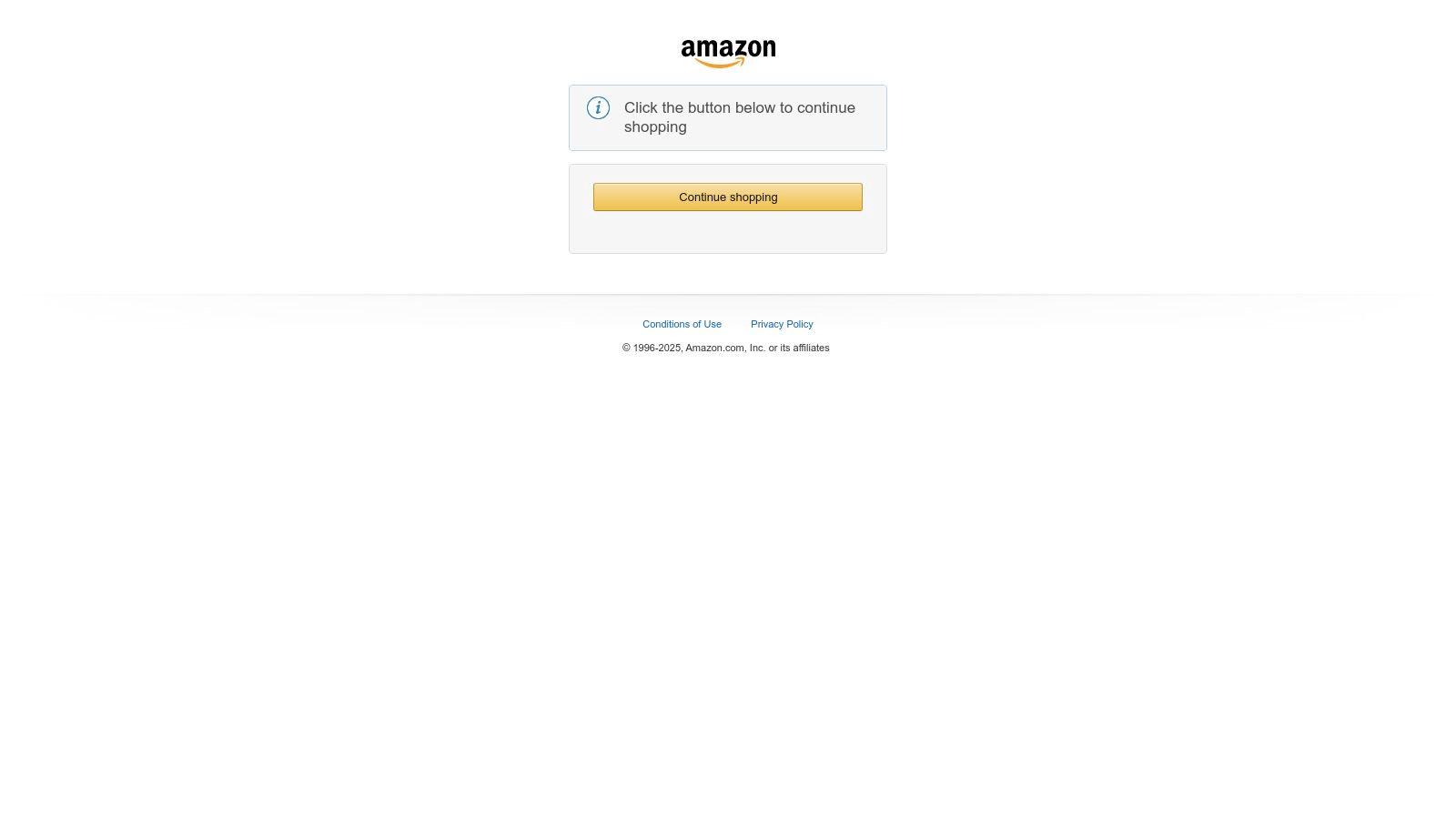
While Amazon lacks the specialized audio support of dedicated retailers, the sheer volume of product reviews and Q&A sections can offer valuable real-world insights. B2B marketers should be cautious and verify they are buying from official brand storefronts or authorized resellers to avoid counterfeit products. Once your gear arrives, you can get a better sense of how it all fits together with our B2B podcast equipment guide. The platform's streamlined returns policy also provides a safety net if a piece of equipment doesn't meet expectations.
Pros and Cons
Pros:
- Lowest Barrier to Entry: A vast selection of affordable, all-in-one kits for new podcasters.
- Streamlined Returns: A simple and reliable 30-day returns process.
- Quick Replacements: Ideal for quickly sourcing accessories or replacement parts with Prime shipping.
Cons:
- Inconsistent Quality: Non-name brand bundles can vary significantly in quality.
- Risk of Counterfeits: Requires diligence to ensure purchases are from official or authorized sellers.
Website: https://www.amazon.com/
5. Guitar Center (including GC Pro)
Guitar Center offers a dual approach to sourcing the podcast equipment needed for your B2B show, catering to both beginners and enterprises seeking professional installations. For those starting out, the consumer site provides accessible microphone packages and bundles from popular brands, often available for same-day pickup. For a more robust setup, GC Pro delivers custom, turnkey solutions, including studio design, multi-mic rigs, and professional wiring consultations, making it a versatile option for companies at any stage of their podcasting journey.
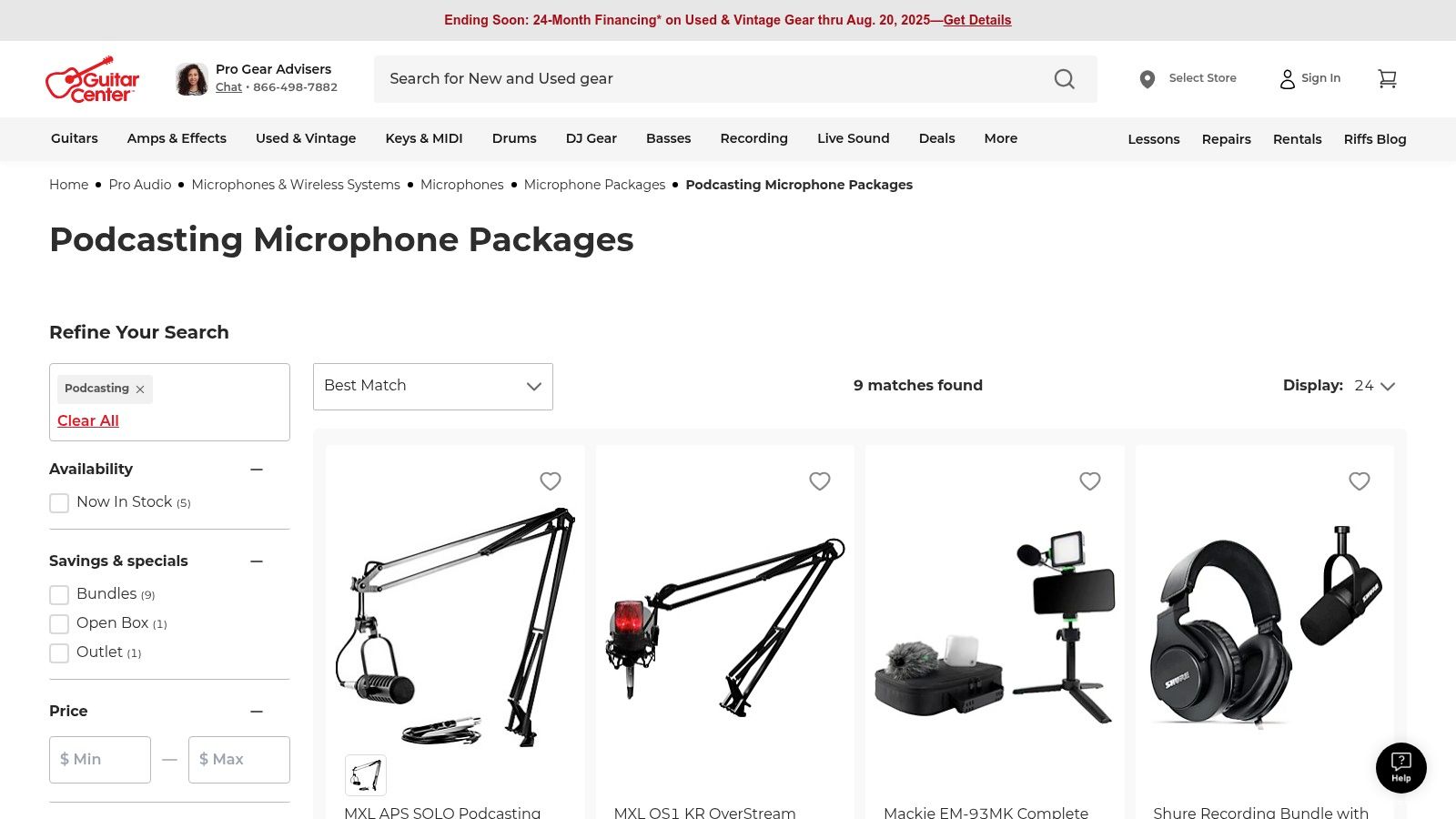
The platform’s key advantage is its physical retail footprint, which simplifies the process of returns and allows for immediate equipment access. While the consumer website is straightforward for buying individual items, B2B teams planning a dedicated recording space will find immense value in GC Pro’s specialized services. This split between retail accessibility and professional consultation ensures that whether you need a simple USB mic or a complete studio build-out, Guitar Center has a viable pathway. They also offer financing and open-box deals, providing flexible purchasing options.
Pros and Cons
Pros:
- Physical Stores: Enables same-day pickup and simplifies the returns process.
- Professional Services: GC Pro offers comprehensive podcast studio design and installation.
- Flexible Options: Provides both simple bundles and high-end custom solutions.
Cons:
- Confusing Navigation: The separation between consumer gear and GC Pro services can be difficult to navigate.
- Varying Selection: Equipment availability depends heavily on whether you are browsing the consumer or professional offerings.
Website: https://www.guitarcenter.com/Podcasting--Microphone-Packages.gc
6. Best Buy
For B2B marketers who need podcast equipment immediately, Best Buy offers a convenient and accessible solution. While not a specialist pro audio store, its dedicated "Podcasting Bundles" page curates reliable gear from major brands like Shure, RØDE, and Samson. This makes it a great option when you need the podcast equipment needed for a new hire or a last-minute travel setup without waiting for shipping. The ability to browse online and pick up in-store the same day is a significant advantage for fast-moving teams.
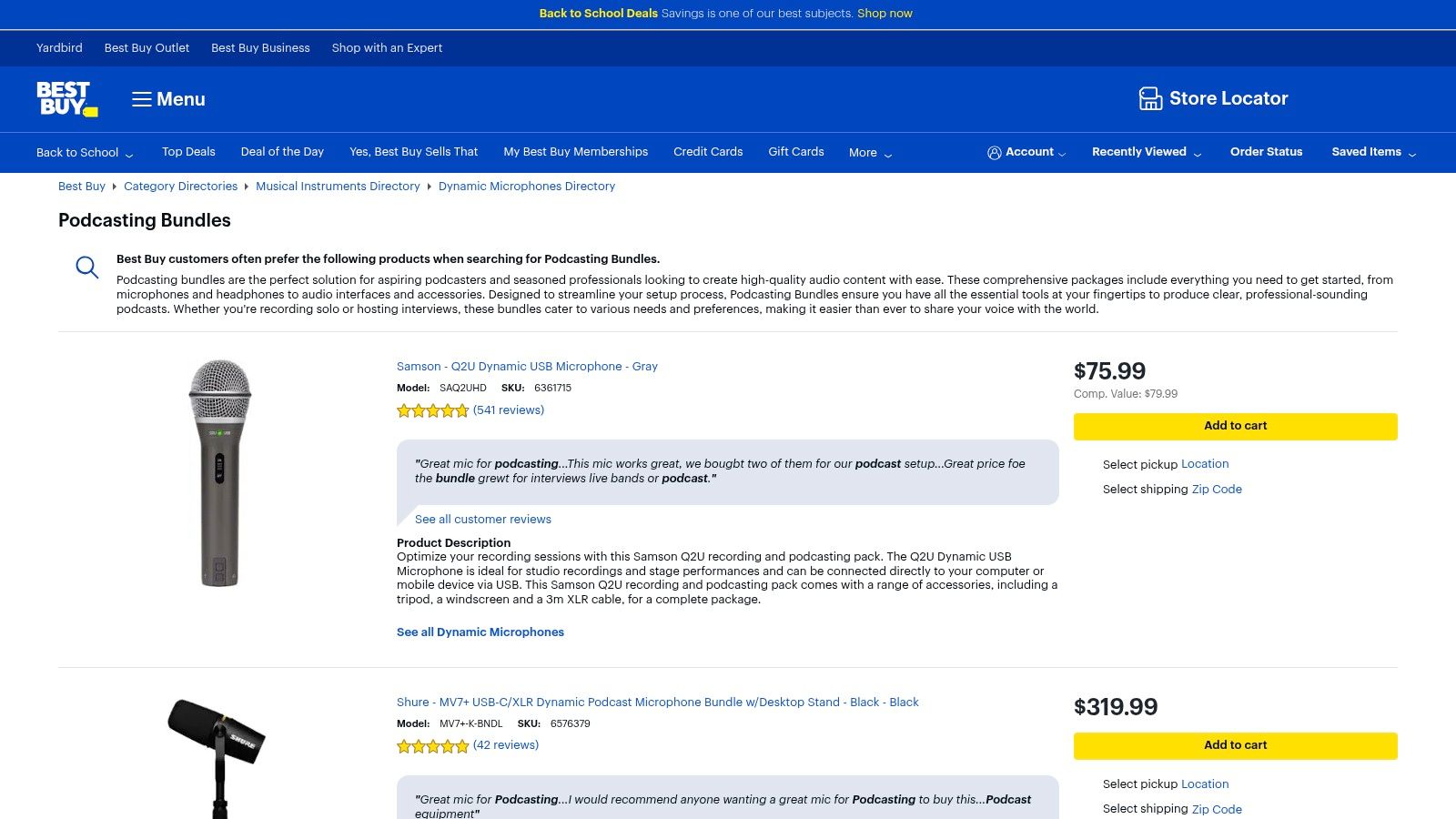
The platform's main value lies in its physical footprint and straightforward return policy, providing peace of mind for buyers who prefer a hands-on approach. You can easily find entry-level USB mics and all-in-one consoles perfect for getting a show off the ground. For those handling the technical side in-house, pairing this gear with external help can be a smart move; you can learn more about B2B podcast production services to streamline your workflow. Best Buy also frequently features sales and open-box deals, offering cost-saving opportunities.
Pros and Cons
Pros:
- Local Pickup: Immediate access to equipment through its vast network of stores.
- Easy Returns: Hassle-free in-store returns provide a safety net for purchases.
- Frequent Deals: Opportunities to find open-box and sale-priced gear.
Cons:
- Limited Selection: The product range is narrower than specialized audio retailers.
- Less Expert Staff: In-store staff may lack deep pro-audio knowledge.
Website: https://www.bestbuy.com/site/shop/podcasting-bundles
7. Shure (brand direct)
For B2B marketers who value authenticity and direct-from-source quality, Shure’s official website is a go-to destination. Shure is synonymous with iconic podcasting microphones like the SM7B, and purchasing directly ensures you receive genuine products. Their platform is more than just a store; it’s an authoritative resource offering in-depth guides on selecting the right podcast equipment needed for your show's specific format, from solo narration to dynamic interviews.
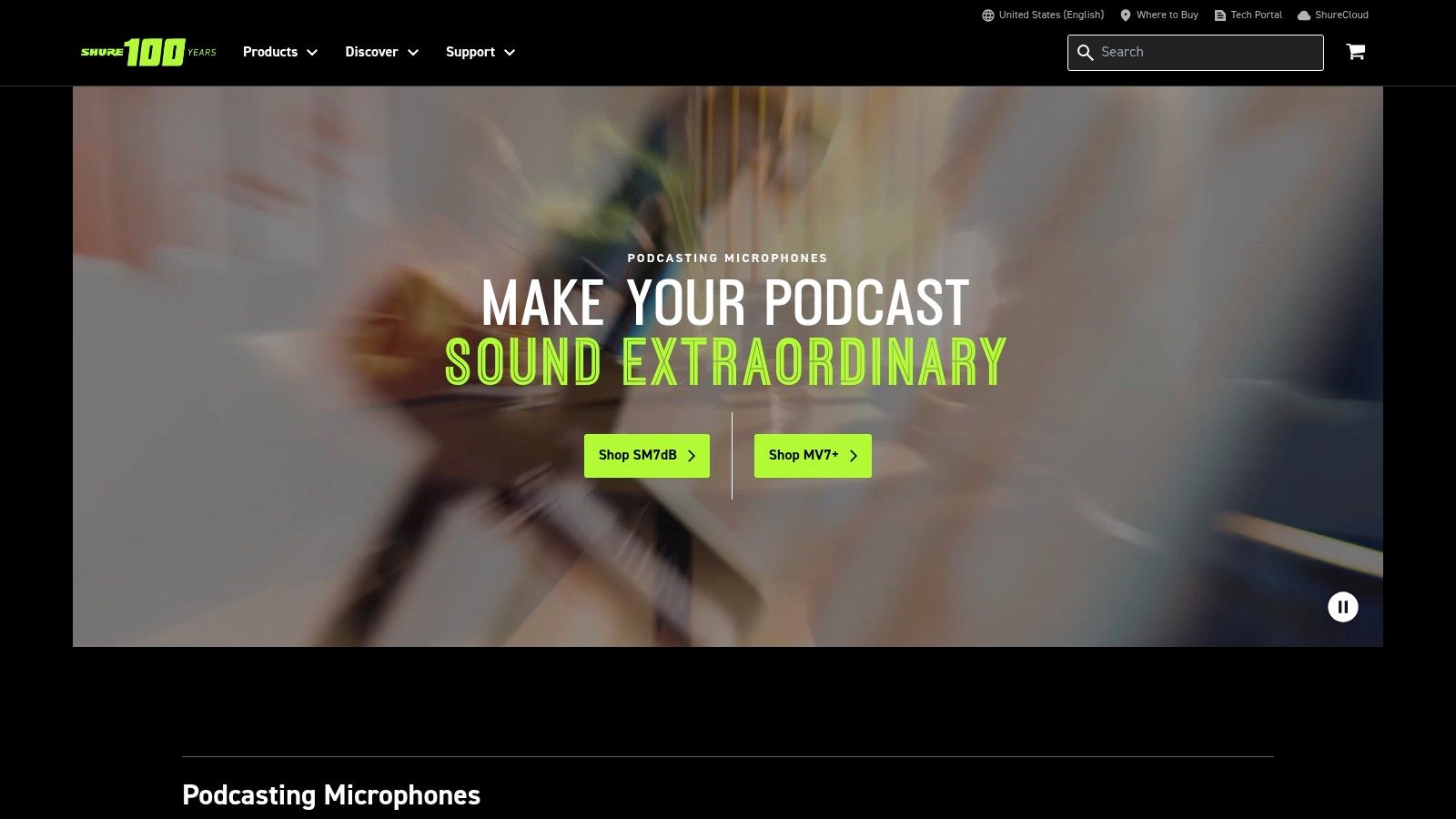
The primary advantage of buying direct is the assurance of receiving the latest product versions with up-to-date firmware and direct access to official support. Shure also curates podcasting bundles that pair their microphones with essential accessories, simplifying the setup process for teams new to audio production. With free shipping on orders over $50 and a 30-day return policy, the brand-direct experience provides both convenience and peace of mind for companies investing in their audio brand.
Pros and Cons
Pros:
- Authentic Products: Guarantees genuine gear directly from the manufacturer.
- Up-to-Date Support: Access to the latest firmware and official customer service.
- Expert Content: Provides authoritative guides and product explanations.
Cons:
- Limited Discounts: Pricing generally follows MAP, so sales are rare.
- Narrow Focus: Only Shure products are available, limiting brand comparison.
Website: https://www.shure.com/en-US/ad/podcasting
8. RØDE (brand direct)
Going directly to the manufacturer is a powerful strategy, and RØDE’s website exemplifies why. It serves as a central hub for their entire podcasting ecosystem, providing an integrated overview of all the podcast equipment needed for a seamless setup. The site excels at showcasing how their products, like the RØDECaster Pro II and PodMic, work together. This is invaluable for B2B teams who want a proven, all-in-one solution without compatibility guesswork.
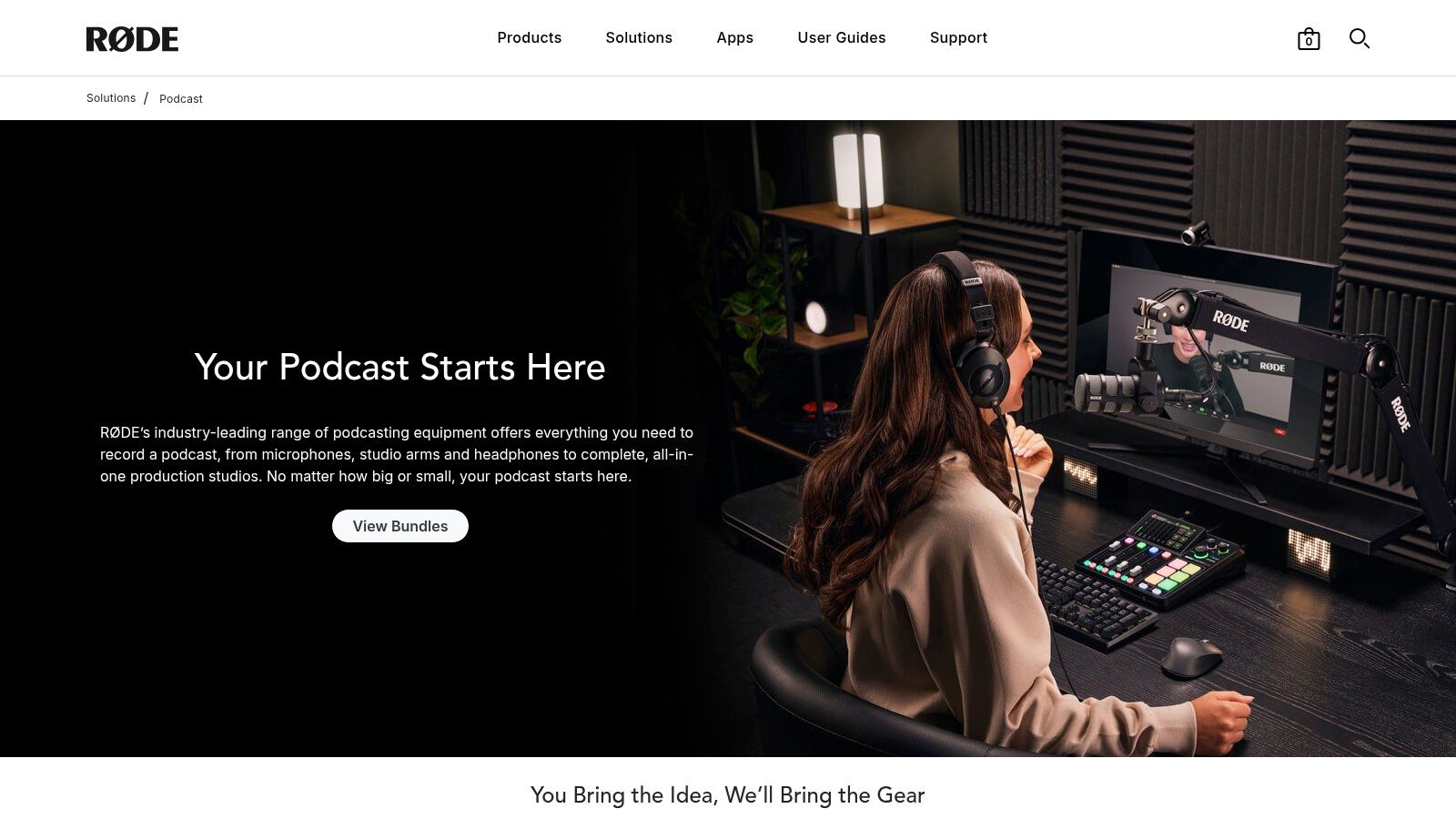
RØDE’s platform is less a direct storefront and more an educational resource and product showcase. It offers detailed specifications, video tutorials, and creator-focused guides that explain the workflow from recording to final production. While you often purchase through their retail partners, the site allows you to build your ideal kit and understand the full capabilities of the RØDE ecosystem. This brand-direct approach ensures you get the most accurate information before investing.
Pros and Cons
Pros:
- Ecosystem Integration: Clearly explains how all their products work together.
- In-Depth Resources: Extensive tutorials and guides for creator workflows.
- Guaranteed Compatibility: Eliminates the risk of mismatched equipment.
Cons:
- Indirect Purchasing: Often directs you to partner retailers to complete a sale.
- Brand-Specific Focus: Limited to only RØDE products, offering no alternatives.
Website: https://rode.com/en-us/solutions/podcast
9. Zoom (brand direct) – PodTrak P4
For B2B teams prioritizing mobility and simplicity, purchasing directly from Zoom offers a streamlined experience for acquiring the podcast equipment needed for on-the-go recording. The brand's official site for the PodTrak P4 highlights its purpose-built design as an ultra-portable recorder. It’s an ideal solution for recording interviews at conferences or setting up a quick multi-person show without needing a computer, making it a standout choice for dynamic marketing teams.
The platform details the P4’s core features, such as four XLR inputs, four independent headphone outputs, and native mix-minus for seamless remote guest call-ins. Its ability to run on batteries or USB power provides unmatched flexibility. While the site is primarily for product information, it connects users with authorized dealers, ensuring a reliable purchase. Once you have the P4, you can learn more about how to produce a podcast that leverages its powerful, compact features.
Pros and Cons
Pros:
- Affordable and Travel-Friendly: Compact, lightweight design perfect for mobile recording.
- Purpose-Built: Designed specifically for podcasting with essential features like mix-minus.
- Reliable Information: Get specifications and features directly from the manufacturer.
Cons:
- Recording Limitations: Sample rate is capped at 44.1 kHz, lower than some professional standards.
- Fewer Onboard Effects: Lacks the advanced processing of larger, more expensive consoles.
Website: https://zoomcorp.com/en/us/podtrak-recorders/podcast-recorders/podtrak-p4/
10. TASCAM (brand direct) – Mixcast 4
TASCAM's Mixcast 4 is an all-in-one podcast station that exemplifies the podcast equipment needed for a streamlined, computer-free workflow. Purchasing directly from the manufacturer ensures you receive a product tailored for podcasters who want integrated recording, mixing, and effects in a single unit. It is designed to be a standalone solution, featuring a 14-track SD card recorder, a user-friendly touchscreen, and dedicated sound pads for triggering audio clips on the fly.
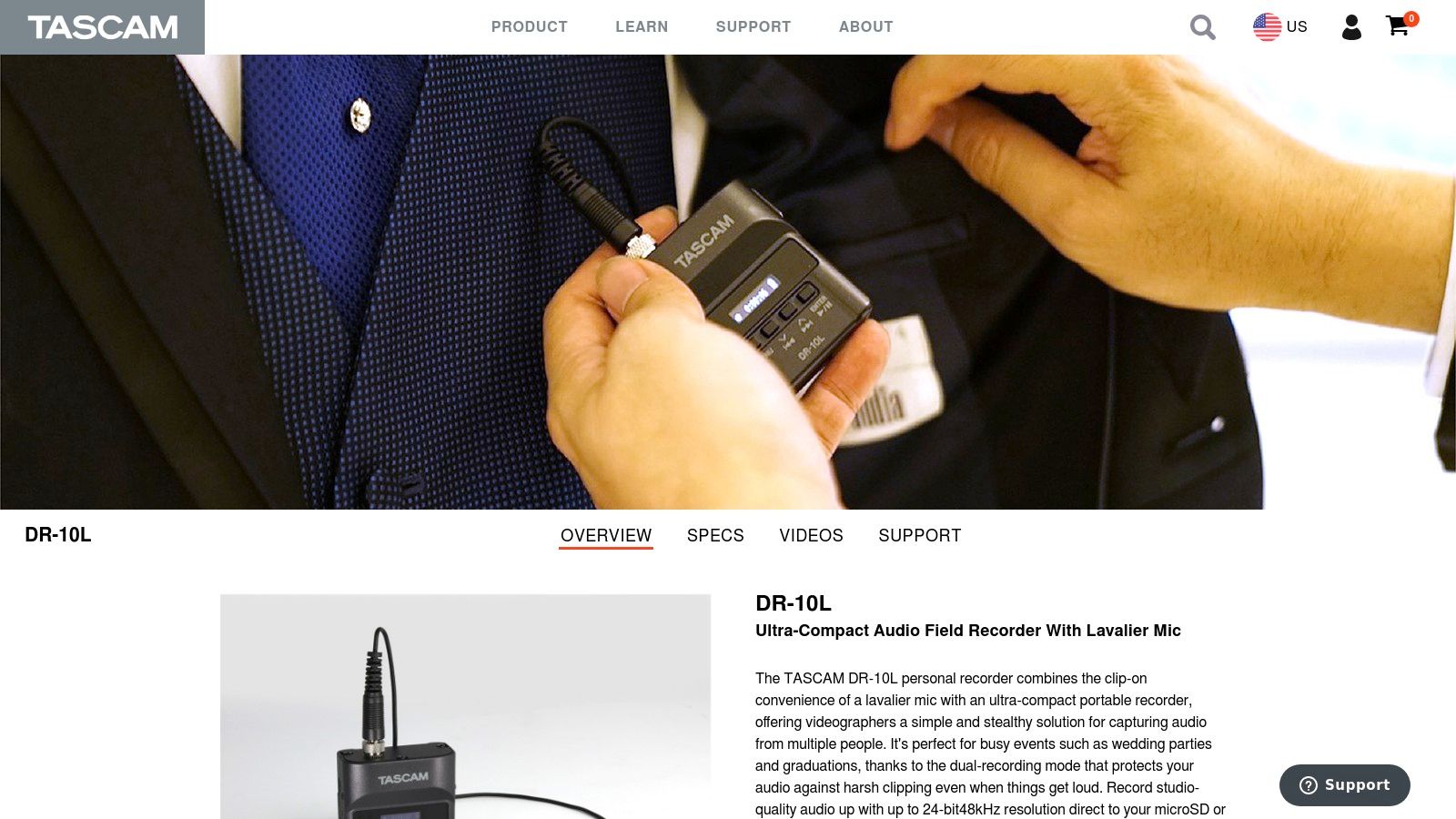
This platform-in-a-box stands out by including companion Podcast Editor software, allowing for basic editing without needing a separate DAW. The Mixcast 4 excels at managing remote guests with its mix-minus functionality via Bluetooth, USB, or TRRS connections, preventing echoes and audio feedback. This integrated approach makes it a powerful hub for B2B teams aiming for a professional, multi-guest format without getting bogged down by complex audio routing and software conflicts.
Pros and Cons
Pros:
- Integrated Workflow: All-in-one recording and mixing simplifies the production process.
- Guest-Friendly: Flexible inputs with mix-minus support for seamless remote interviews.
- Bundled Software: Includes Podcast Editor software for post-production convenience.
Cons:
- Large Footprint: Takes up more desk space than a typical audio interface.
- Learning Curve: May feel complex for users new to multi-channel mixers.
Website: https://tascam.com/us/product/mixcast_4/review
11. Focusrite (brand direct) – Vocaster Range
Focusrite directly addresses the needs of modern creators with its Vocaster series, purpose-built interfaces that simplify the technical side of recording. This lineup is a standout choice for finding the podcast equipment needed because it integrates user-friendly features like Auto Gain, which automatically sets your microphone level, and Enhance, which adds vocal clarity with a single button press. This approach removes common audio hurdles, making it ideal for B2B marketers who need to produce high-quality audio without a steep learning curve.
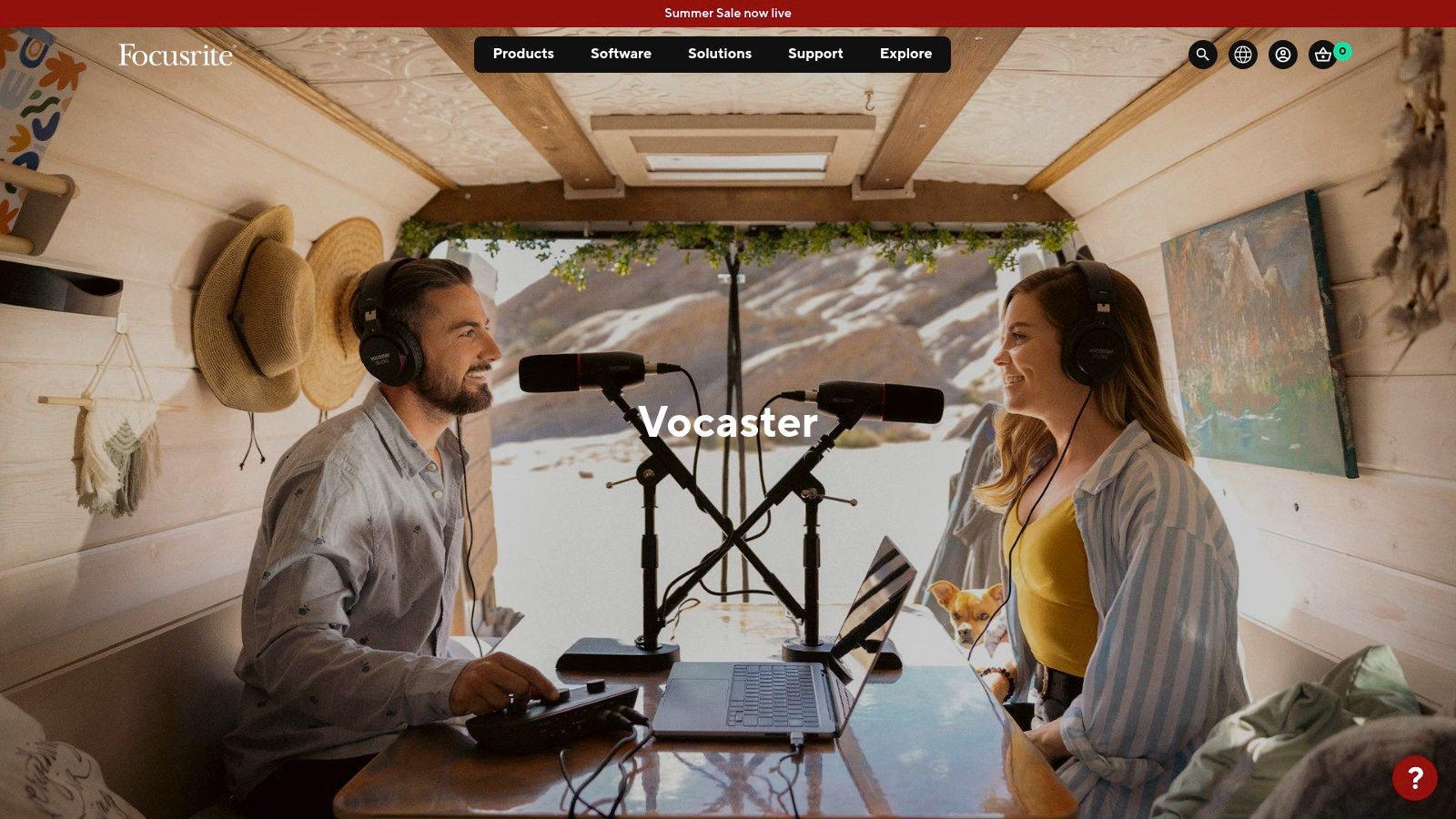
The Vocaster Two model is particularly notable for its Bluetooth connectivity, which allows hosts to seamlessly record remote interviews from a smartphone with mix-minus built-in. This prevents the guest from hearing an echo of their own voice. Each interface provides up to 70 dB of gain, more than enough for popular, gain-hungry dynamic mics like the Shure SM7B. With bundled software and complete studio kits available directly from their site, Focusrite provides an all-in-one solution that integrates perfectly with other essential podcast tools.
Pros and Cons
Pros:
- Podcast-Specific Design: Features like Auto Gain and Enhance streamline recording workflows.
- Ample Gain: Easily powers demanding dynamic microphones without extra hardware.
- Complete Packages: Studio kits offer a microphone and headphones for a full setup.
Cons:
- Limited Sample Rate: Operates at a 48 kHz maximum, which is ideal for voice but less versatile for music production.
- Plastic Build: The interface housing is less durable than its metal-clad Scarlett counterparts.
Website: https://us.focusrite.com/vocaster
12. Elgato (brand direct) – Wave XLR
Elgato has carved a niche by creating hardware specifically for content creators, and their Wave XLR audio interface is a prime example of this focus. For B2B marketers and solo hosts, this compact device simplifies the often complex world of audio, providing the essential podcast equipment needed to connect a professional XLR microphone to a computer. Its single-knob control, capacitive mute button, and clean preamp make getting great audio straightforward, eliminating technical barriers.
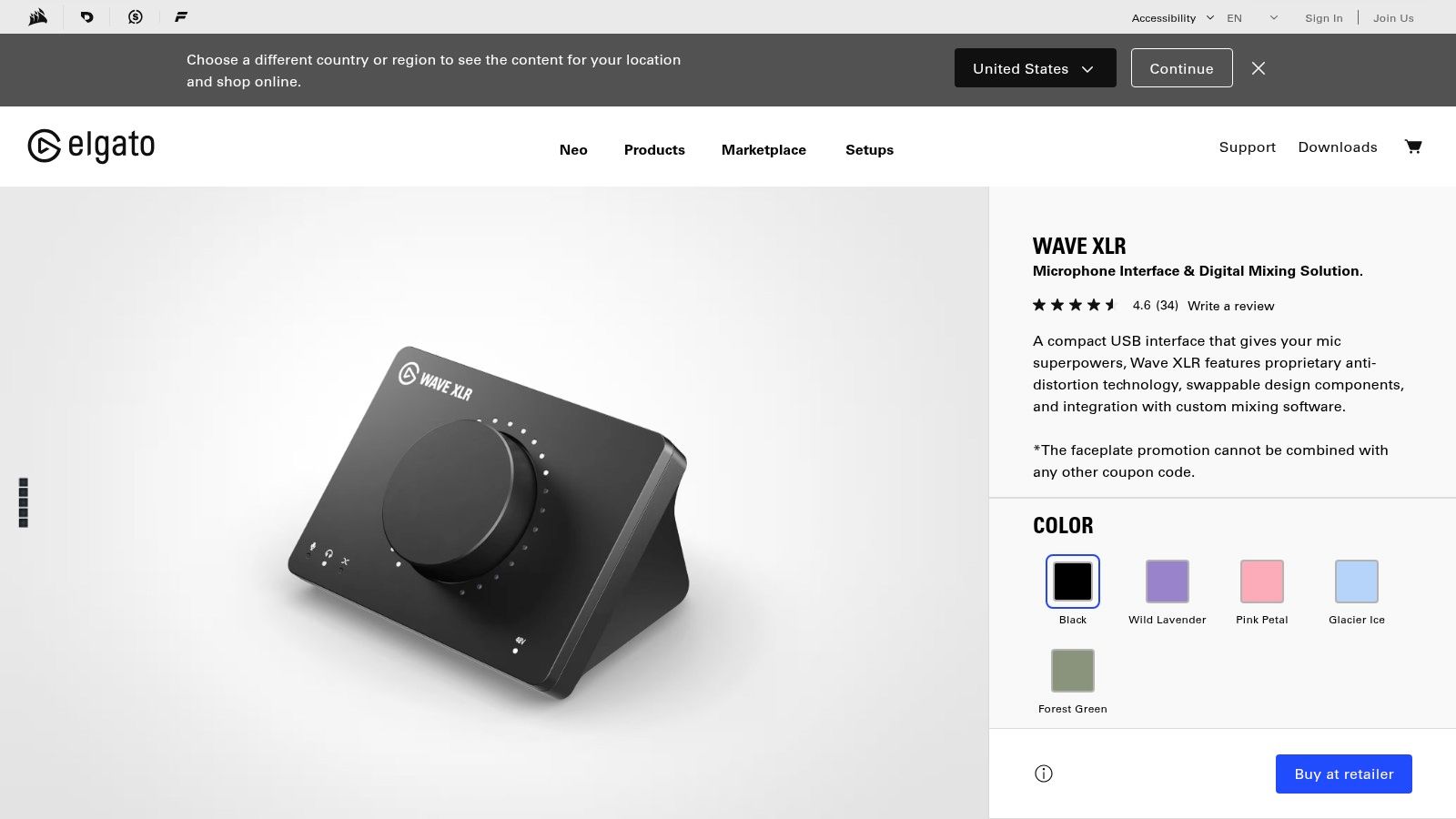
The Wave XLR's true power is unlocked through its integration with Elgato’s Wave Link software, a virtual mixer that allows you to blend your microphone audio with other sources like music or video clips. This ecosystem is ideal for podcasters who also create video content or live stream, as it offers seamless control. Furthermore, its native compatibility with the Elgato Stream Deck provides tactile, one-press control over audio functions, creating a highly efficient and professional workflow for busy marketers.
Pros and Cons
Pros:
- Creator-Focused Workflow: Optimized for podcasting and live shows with intuitive software.
- Ecosystem Integration: Works seamlessly with Stream Deck for enhanced tactile control.
- Compact and Simple: Easy setup with a minimal footprint, perfect for a single-mic setup.
Cons:
- Single XLR Input: Limits use to solo hosts or requires complex software routing for guests.
- Varying Availability: Price and stock can fluctuate between Elgato’s direct store and other retailers.
Website: https://www.elgato.com/ww/en/p/wave-xlr
Podcast Equipment Comparison Matrix
From Gear to Growth: Why B2B Podcast Promotion is Non-Negotiable
Acquiring the right podcast equipment needed is the crucial first step in creating a professional-sounding B2B show. High-quality audio from a great microphone and interface establishes credibility and ensures your message is delivered with authority. But what happens after you hit "stop" on the recording? The most pristine audio is useless if it doesn't reach the right audience. This is where the real work begins, transforming your equipment investment into a powerful marketing asset.
What are the benefits of investing in B2B podcast promotion?
Investing in B2B podcast promotion transforms your show from a static piece of content into a dynamic engine for business growth. The primary benefits include:
- Increased Brand Visibility and Authority: Promotion moves your podcast beyond your existing network, placing your brand in front of new, relevant audiences. This consistent exposure establishes you as a go-to authority in your niche, building trust with potential customers before they even speak to a sales rep.
- High-Quality Lead Generation: Effective promotion targets your ideal customer profile. By sharing valuable insights, you attract engaged listeners who are genuinely interested in your industry and solutions, creating a pipeline of warm, well-informed leads.
- Accelerated Audience Growth: Organic growth is slow. A dedicated promotion strategy uses multiple channels—like social media, email newsletters, and guest collaborations—to rapidly build a loyal subscriber base, magnifying the impact of every episode.
- Measurable Return on Investment (ROI): Unlike passive content, a promoted podcast generates trackable data. You can measure listener growth, website traffic, and lead conversions attributed to your show, directly linking your podcasting efforts to business revenue.
What are effective B2B podcast promotion strategies?
Effective B2B podcast promotion strategies are multi-faceted, turning each episode into a comprehensive marketing campaign. Some of the most potent tactics include:
- Content Repurposing: A single episode can fuel weeks of marketing. Create audiograms for social media, pull-quotes for LinkedIn posts, video clips for YouTube, and detailed blog posts from episode transcripts.
- Guest and Partner Collaboration: Leverage the network of your guests by providing them with pre-made promotional assets (clips, quotes, graphics) to share with their audience. Collaborate with partners, such as Motion, a productivity tool that helps busy marketing teams manage complex promotional schedules, to cross-promote content to aligned audiences.
- Email and Social Media Integration: Promote new episodes through your B2B email newsletter and B2B social media channels. This nurtures your existing audience and drives consistent engagement. Use targeted paid ads on platforms like LinkedIn to reach specific job titles and industries.
- Community Engagement: Participate in relevant online communities and forums where your target audience gathers. Share valuable clips and insights from your show (without being overly self-promotional) to spark discussion and drive listeners to your podcast.
- SEO and Discoverability: Optimize your show notes and episode titles with relevant keywords to improve search visibility on podcast platforms and search engines like Google.
How can podcast marketing services boost our company's visibility?
Podcast marketing services act as a force multiplier for your B2B show, providing the expertise and resources needed to scale your reach far beyond what most in-house teams can achieve alone. These services boost visibility by:
- Implementing a Cohesive Strategy: An agency develops and executes a comprehensive promotion plan, ensuring consistent and professional marketing across all channels.
- Expert Content Creation: They are skilled at identifying the most impactful moments in your episodes and turning them into compelling promotional assets like video clips, audiograms, and carousels that stop the scroll.
- Targeted Distribution: Agencies use their expertise to get your content in front of the right people through paid social campaigns, outreach to industry influencers, and placement in relevant newsletters and publications.
- Saving Time and Resources: Outsourcing promotion frees up your internal team to focus on their core competencies, like hosting great interviews and building relationships, rather than getting bogged down in the minutiae of content creation and scheduling.
What packages do B2B podcast promotion services typically offer?
B2B podcast promotion services, like the B2B podcast production services offered by Fame, typically offer tiered packages tailored to a company's goals and budget. Common offerings include:
- Basic Package: Often includes professional audio editing, show notes creation, and publishing to all major podcast platforms.
- Growth Package: Builds on the basic package with content repurposing, such as creating two to three social media clips (audiograms or video) per episode, quote graphics, and a promotional email copy.
- Advanced/Full-Service Package: This is a comprehensive solution for B2B startups and established companies aiming for market leadership. It includes all of the above, plus extensive social media asset creation (e.g., 5-10 clips per episode), LinkedIn article writing, paid ad management, and strategic outreach to maximize reach and lead generation.
Ultimately, the best podcast equipment serves as the vehicle for your message. But without a map and fuel, that vehicle goes nowhere. A robust promotion strategy is your navigation system, guiding your podcast to the right listeners and turning your initial gear investment into a powerful engine for brand growth and market leadership.
Ready to turn your equipment into a revenue-generating asset? Fame specializes in transforming B2B podcasts from well-produced shows into powerful marketing engines. We handle the production, promotion, and content repurposing so you can focus on building authority and driving growth.

